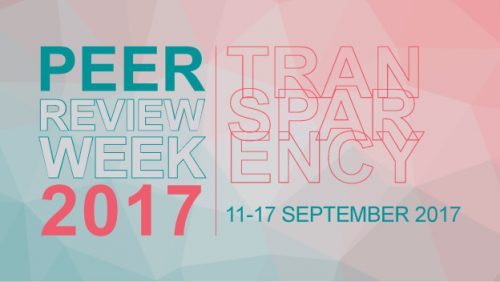
It’s natural that AMS–an organization deeply involved in peer review–participates in Peer Review Week 2017. This annual reflection on peer review was kicked off today by the International Congress of Peer Review and Scientific Publication in Chicago. If you want to follow the presentations there, check out the videos and live streams.
Since peer review is near and dear to AMS, we’ll be posting this week about peer review, in particular the official international theme, “Transparency in Review.”
To help bring some transparency to peer review, AMS Publications Department presented a panel discussion on the process in January at the 2017 AMS Annual Meeting in Seattle. Tony Broccoli, longtime chief editor of the Journal of Climate, was the moderator; other editors on the panel were Carolyn Reynolds and Yvette Richardson of Monthly Weather Review, Walt Robinson of the Journal of Atmospheric Sciences, and Jeff Rosenfeld of the Bulletin of the American Meteorological Society.
You can hear the whole thing online, but we’ll cover parts of the discussion here over the course of the week.
For starters, a lot of authors and readers wonder where editors get peer reviewers for AMS journal papers. The panel offered these answers (slightly edited here because, you know, that’s what editors do):
Richardson: We try to evaluate what different types of expertise are needed to evaluate a paper. That’s probably the first thing. For example, if there’s any kind of data assimilation, then I need a data assimilation expert. If the data assimilation is geared toward severe storms, then I probably need a severe storms expert too. First I try to figure that out.
Sometimes the work is really related to something someone else did, and that person might be a good person to ask. Sometimes looking through what papers they are citing can be a good place to look for reviewers.
And then I try to keep reaching out to different people and keep going after others when they turn me down…. Actually, people are generally very good about agreeing to do reviews and we really have to thank them. It would all be impossible without that.
Reynolds: If you suggest reviewers when you submit to us, I’ll certainly consider them. I usually won’t pick just from the reviewers suggested by the authors. I try to go outside that group as well.
Broccoli: I would add, sometimes if there’s a paper on a topic where there are different points of view, or the topic is yet to be resolved, it can be useful to identify as at least one of the reviewers someone who you know may have a different perspective on that topic. That doesn’t mean you’re going to believe the opinion of that reviewer above the opinion of others but it can be a good way of getting a perspective on a topic.
Rosenfeld: Multidisciplinary papers can present problems for finding the right reviewers. For these papers, I do a lot of literature searching and hunt for that key person who happens to somehow intersect, or be in between disciplines or perspectives; or someone who is a generalist in some way, whose opinion I trust. It’s a tricky process and it’s a double whammy for people who do that kind of research because it’s hard to get a good evaluation.
• • •
If you’re interested in becoming a reviewer, the first step is to let AMS know. For more information read the web page here, or submit this form to AMS editors.